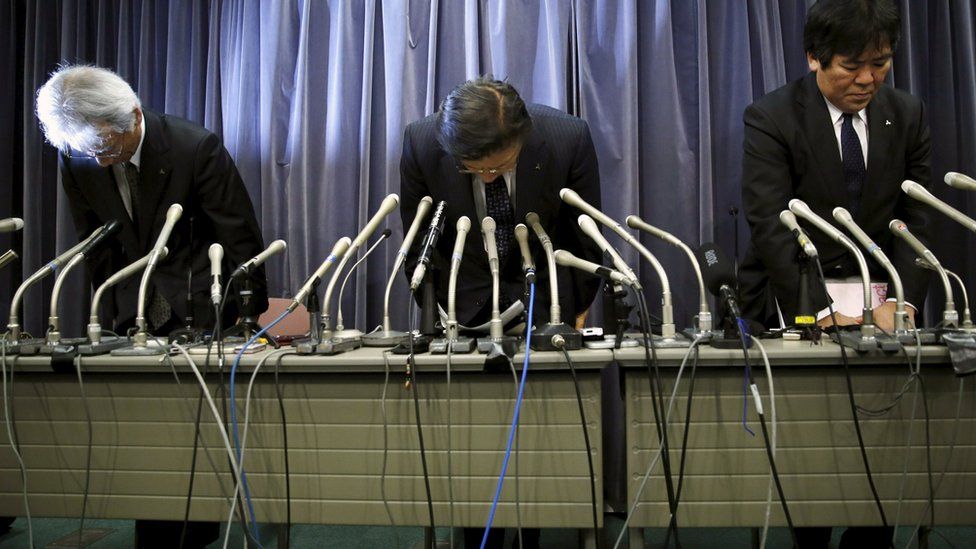Mitsubishi Motors admits falsifying fuel economy tests
- Published

Mitsubishi Motors has admitted falsifying fuel economy data for more than 600,000 vehicles sold in Japan.
Tyre pressure figures were falsified by employees to flatter mileage rates, the company said.
Almost 470,000 vehicles that Mitsubishi made for Nissan were affected and the issue was uncovered after Nissan found inconsistencies.
The announcement sent shares in Mitsubishi down more than 15% in Tokyo.
Company bosses, including Mitsubishi Motors president Tetsuro Aikawa, bowed deeply at the start of a press conference on Wednesday afternoon in Tokyo.
"The wrongdoing was intentional. It is clear the falsification was done to make the mileage look better. But why they would resort to fraud to do this is still unclear," he said.
Although he was unaware of the irregularities, Mr Aikawa said: "I feel responsible."
The inaccurate tests involved 157,000 of its own cars and 468,000 vehicles produced for Nissan.
The issue affected models including Mitsubishi's ek Wagon and eK Space, as well as Nissan's Dayz and Dayz Roox.
All are "mini-cars" with 660cc petrol engines and are popular in Japan but have found little success in other markets.
Lance Bradley, UK managing director of Mitsubishi Motors, said there was no evidence that any models sold in the UK or Europe were affected.
The company is Japan's sixth-largest car maker and sold more than one million vehicles last year, but has less than 1% of the UK market.
The issue was reported to Japan's transportation ministry and Nissan told dealers to stop selling the affected vehicles. It was considering ways to help owners of the affected cars.
Shares in Mitsubishi Motors closed down 131 yen at 733 yen in Tokyo - their biggest one-day fall in nearly 12 years.
Analysis: Richard Westcott, BBC transport correspondent
We still don't have all the details, but this seems to come down to the way Mitsubishi measured miles per gallon in the lab.
It's done on a thing called a rolling road, basically a treadmill for cars.
You can adjust how resistant it is, the way you'd adjust the treadmill in the gym to make it harder or easier to run.
It seems Mitsubishi deliberately used the wrong tyre pressures, as a way of cheating the treadmill test to get more miles per gallon out of the car. Artificially over-inflated tyres give better results.
Interestingly, it looks like another car maker, Nissan, found them out.
This isn't remotely as large or sophisticated as the cheat used by VW. But it's another nail in the coffin for the car industry's already damaged reputation.
Scandals
Mitsubishi struggled for years to regain consumer trust after a defects scandal in the early 2000s that covered up problems such as failing brakes, faulty clutches and fuel tanks that fell off vehicles.
This is the first time that a Japanese car maker has reported misconduct involving fuel economy tests.
In 2014 South Korean car makers Hyundai and its affiliate, Kia, agreed to pay $350m in US penalties for overstating their vehicles' fuel economy ratings. They also resolved claims from car owners.
Mitsubishi's announcement follows on from the Volkswagen's emissions scandal last year, in which it was found to have cheated diesel emissions tests in the United States and elsewhere.
VW is recalling millions of cars worldwide as a result of the scandal and has set aside €6.7bn (£4.8bn) to cover costs.
'Three diamonds'
It resulted in the company posting its first quarterly loss for 15 years of €2.5bn in late October.
Mitsubishi Motors is part of the Mitsubishi Group, which includes about 40 individual companies. The group was established in 1870 as a shipping company and its name roughly translates to "three diamonds" - hence its logo.
The main divisions are the Mitsubishi UFJ Financial Group; Mitsubishi Corporation - Japan's largest general trading company; and Mitsubishi Heavy Industries - which includes atomic, chemical and power systems divisions as well as the car maker.
- Published20 April 2016
- Published27 January 2016
- Published20 January 2016
- Published10 December 2015